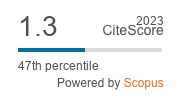Differences in the Development and Investment in Human Capital in the Member States of the European Union
DOI:
https://doi.org/10.2478/v10103-012-0011-0Abstract
Human capital and knowledge are most important factors of current development processes, contributing to the innovativeness and competitiveness of the economies. The important role of these factors was underlined also in Europe 2020 Strategy. However, due to immaterial character of investment in human capital and because of the high level of decentralization of human capital development policy, these actions are characterized by a relatively low efficiency. Thus, the aim of this paper is firstly to identify the importance of human capital development policy within EU policies. Secondly, it is to identify and conduct a comparative analysis of national differences in human capital development and to identify points of reference for key measures of the development in question. Thirdly, this paper is to specify models of human capital development policy from the perspective of how much involved local authorities are in its implementation and efficiency.
Downloads
References
Budzyńska A., Duszczyk M., Gancarz M., Gieroczyńska E., Jatczak M., Wójcik K. (2002), Strategia Lizbońska. Droga do sukcesu zjednoczonej Europy, Departament Analiz Ekonomicznych i Społecznych, Urząd Komitetu Integracji Europejskiej, Warszawa
Google Scholar
Council conclusions of 12 May 2009 on a strategic framework for European cooperation in education and training („ET 2020”), 2009/C 119/02
Google Scholar
Council conclusions on benchmark for learning mobility 2011/C 372/08, Annex: A reference level of European average performance (European benchmark) in the field of learning mobility
Google Scholar
Council Conclusions on the role of education and training in the implementation of the „Europe 2020” strategy, 2011/C 70/01
Google Scholar
Council Recommendation of 28 June 2011 on policies to reduce early school leaving, 2011/C 191/01
Google Scholar
Decision No 2241/2004/EC of The European Parliament And of The Council, of 15 December 2004 on a single Community framework for the transparency of qualifications and competences (Europass), L 390/6
Google Scholar
Decision No. 1720/2006/of the European Parliament and of the Council of 15 November 2006 establishing an action programme for lifelong learning, Official Journal of the European Union, L 327/45, in the following period the programme was continued under the title „An Agenda for new skills and jobs”
Google Scholar
Delivering On The Modernisation Agenda For Universities: Education, Research And Innovation, Communication From The Commission To The Council And The European Parliament, COM(2006) 208 final, Brussels, 10.5.2006
Google Scholar
Education and training in a smart, sustainable and inclusive Europe, COM(2011) 902 final
Google Scholar
Europe 2020. A strategy for smart, sustainable and inclusive growth, Communication of the European Commission, Brussels, 3.3.2010, COM(2010) 2020 final
Google Scholar
Lucas R. E. (1988), On the mechanics of economic development, University of Chicago, Journal of Monetary Economics
Google Scholar
Nelson R., Phelps E. (1966), Investment in humans, technological diffusion, and economic growth. The American Economic Review, Vol. 56, No. 1/2, American Economic Association
Google Scholar
Nowakowska A. (2010), Zdolności innowacyjne polskich regionów, Wydawnictwo Uniwersytetu Łódzkiego, Łódź
Google Scholar
Nowakowska A. (2011), Regionalny wymiar procesów innowacji, Wydawnictwo Uniwersytetu Łódzkiego, Łódź
Google Scholar
Nowakowska A., Przygodzki Z., Sokołowicz M. (2011), Region w gospodarce opartej na wiedzy. Kapitał ludzki - innowacje - korporacje transnarodowe, Difin, Warszawa
Google Scholar
Opinion of the Committee of the Regions „European cooperation in vocational education and training to support the Europe 2020 strategy, 2011/C 42/07
Google Scholar
Pietrzyk I. (2000), Polityka regionalna Unii Europejskiej i regiony w państwach członkowskich, PWN, Warszawa 2000
Google Scholar
Presidency conclusions – Brussels, 22& 23March 2005, European Council, Brussels, 23 March 2005 [CONCL 1 7619/05]
Google Scholar
Presidency conclusions, 23-24 March 2006, European Council, Brussels, 24 March 2006 [CONCL 1 7775/06]
Google Scholar
Recommendation of the European Parliament and of the Council of 23 April 2008 on the establishment of the European Qualifications Framework for lifelong learning, 2008 / C 111/01
Google Scholar
Romer P. (1990), Endogenous technological change, ‘Journal of Political Economy’, Vol. 98, No. 5, Part 2 The University of Chicago Press
Google Scholar
Supporting growth and jobs – an agenda for the modernisation of Europe’s higher education systems, COM(2011) 567 final
Google Scholar
Szymańska A. (2004), Efektywność wykorzystania zasobów ludzkich jako priorytet Strategii Lizbońskiej [in:] M. Klamut i E. Pancer-Cybulska (red.) Polska w rozszerzonej Unii Europejskiej - uwarunkowania i perspektywy rozwoju, tom 1, red. M. Klamut i E. Pancer-Cybulska, Prace
Google Scholar
Naukowe Akademii Ekonomicznej im. O. Langego we Wrocławiu Nr 1031, Wydawnictwo Akademii Ekonomicznej im. O. Langego we Wrocławiu, Wrocław
Google Scholar
Tackling early school leaving: A key contribution to the Europe 2020 Agenda, Communication from the Commission to the European Parliament, the Council, the European Economic and Social Committee and the Committee of the Regions, Brussels, 31.1.2011, COM(2011) 18 final
Google Scholar
The Lisbon strategy for growth and employment, Report from the High Level Group chaired by Wim Kok, European Communities 2004
Google Scholar
Thieme J. K. (2009), Szkolnictwo wyższe. Wyzwania XXI wieku. Polska, Europa, USA, Difin, Warszawa
Google Scholar
Downloads
Published
How to Cite
Issue
Section
License

This work is licensed under a Creative Commons Attribution-NonCommercial-NoDerivatives 4.0 International License.











